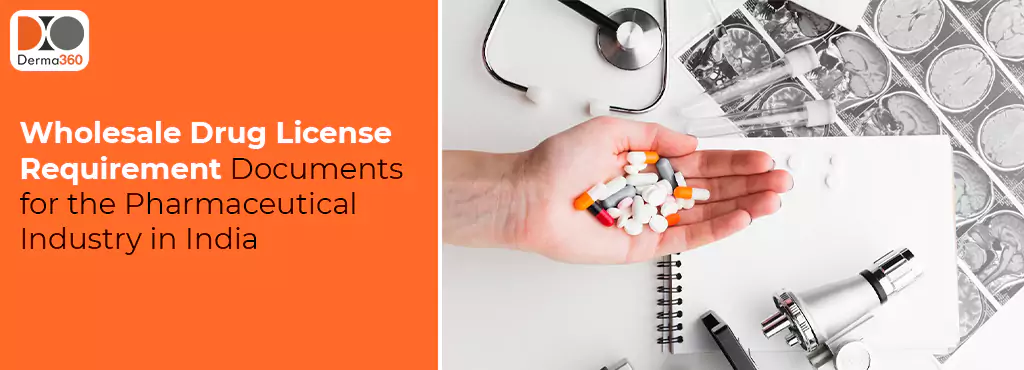The pharmaceutical industry in India plays a vital role in meeting the healthcare needs of the population. To operate as a wholesale distributor of pharmaceutical products, obtaining a wholesale drug license is a crucial requirement. This license ensures compliance with the regulatory framework set forth by the Central Drugs Standard Control Organization (CDSCO) in India. In this blog post, we will explore the key documents required for obtaining a wholesale drug license in the pharmaceutical industry in India, shedding light on the necessary paperwork and regulatory processes.
Wholesale Drug License Requirement Documents –
Application Form

The first step in acquiring a wholesale drug license in India is to submit an application form. The application form can be obtained from the respective State Drugs Control Department or the CDSCO website. The form requires detailed information about the business entity, such as the company’s name, address, contact details, and the type of license being sought (wholesale or retail). It is important to ensure that the application form is completed accurately and all the required information is provided to expedite the licensing process.
Proof of Constitution

To establish the legal structure and ownership of the pharmaceutical business, proof of constitution documents must be submitted. These documents may include a partnership deed, memorandum of association, articles of association, certificate of incorporation, or any other legal document that verifies the ownership and structure of the company. It is crucial to ensure that these documents are up to date and comply with the legal requirements of the Companies Act, 2013, or other applicable laws.
Premises Details and Layout

The wholesale drug license application in India requires detailed information about the premises where the pharmaceutical business will operate. This includes providing the complete address of the premises, along with layout plans and photographs. The layout must comply with the guidelines prescribed by the CDSCO, ensuring proper storage facilities for pharmaceutical products, adequate space for operations, and adherence to good storage practices. It is important to highlight any specific areas designated for the storage and handling of controlled substances, if applicable.
Storage and Warehouse Infrastructure

The application for a wholesale drug license in India also requires information about the storage and warehouse infrastructure. This includes details about the size and dimensions of the storage areas, temperature control mechanisms, and facilities for proper ventilation and lighting. The infrastructure must adhere to the guidelines specified in Schedule M of the Drugs and Cosmetics Act, ensuring adequate space for different categories of drugs, proper segregation, and protection against environmental factors.
Registered Pharmacist Appointment

As per Indian regulations, wholesale drug license applicants must appoint a registered pharmacist who will oversee the operations. The application requires the submission of documents such as the appointment letter, proof of the pharmacist’s registration with the State Pharmacy Council, and their qualifications. This requirement ensures that a qualified professional is responsible for maintaining the integrity of the pharmaceutical supply chain and compliance with relevant regulations.
Standard Operating Procedures (SOPs)

The wholesale drug license application in India often requires the submission of Standard Operating Procedures (SOPs) related to various aspects of the pharmaceutical business. These SOPs outline processes and protocols for receiving, storing, packaging, labelling, distributing, and handling pharmaceutical products. The SOPs should adhere to the guidelines specified by the CDSCO and ensure compliance with good distribution practices, quality control measures, and safety protocols.
Quality Control Measures

Demonstrating adherence to quality control measures is crucial in the pharmaceutical industry. Wholesale drug license applicants in India are required to provide documents related to quality control measures, including quality management systems, quality control testing procedures, and quality assurance protocols. These documents showcase the company’s commitment to maintaining product integrity, ensuring the supply of safe and effective medications, and complying with the standards set by the CDSCO.
Conclusion
Acquiring a wholesale drug license in the Indian pharmaceutical industry involves fulfilling specific document requirements as per the guidelines of the CDSCO. By understanding and preparing the necessary paperwork, pharmaceutical wholesalers can ensure compliance with regulatory standards, contribute to public health, and play a crucial role in the distribution of quality medications. It is essential to consult with the respective State Drugs Control Department or seek professional guidance to navigate the licensing process smoothly.
Here are some other blogs you might be interested in reading:



